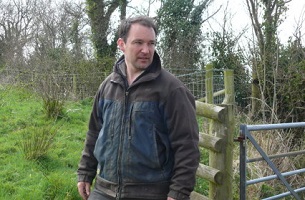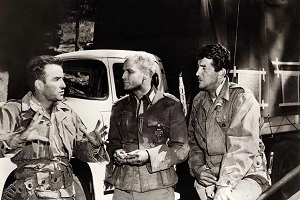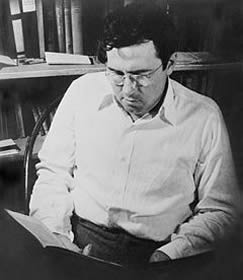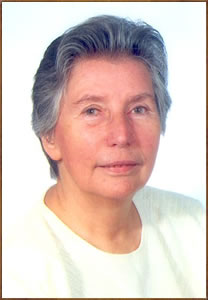De Welshe schrijver Cynan Jones werd geboren op 27 februari 1975 in Aberystwyth, Wales. Zie ook alle tags voor Cynan Jones op dit blog.
Uit: The Long Dry
“He comes in, scraping his feet on the metal grill outside the back door, not because he needs to, but from habit. Or perhaps it is his announcement—a signal they have always had but never spoken of. They had many of these when they were younger.
She rinses the cafetière and warms the cup with water from the kettle, which she’s boiled several times while she has waited for him. She does not make the coffee. Some things she mustn’t do. She’s threatened by the coffee, about how strong to make it, how it tastes when it is made. He makes coffee every day, just for himself as no one else drinks it. He makes a strong potful of coffee at this time of the morning and it does him for the day, warming up the cupfuls in a pan as they are needed, which makes them stronger as the day goes on. No one else touches the pan. She says it’s why he does not sleep. His first coffee each morning is the remnants of the night before because he does not want to wake the house grinding the beans, and the children sleep above the thin ceiling of the kitchen.
He sits at the table with a loose fist and runs his thumb over the first joint of his forefinger in the way he has, so it makes a quiet purring sound, like rubbing leather.
“What about the dosing?”
“It’ll have to wait,” he says.
He rubs his finger. He does this always at the table, talking or reading a paper, even with the handle of a cup held there, so that this part of his finger is smooth and shines. Whenever he’s at rest.
“I don’t know,” he says. “I’ve checked the obvious places and she’s not there. She’s got her head down and gone.”
He does not tell her about the stillborn calf.
“It’s typical. It has to be today,” she says. “I should have gotten up to check.”
“She would have gone anyway,” he says quietly.
He looks down at the missing part of his little finger on his right hand and makes the sound against his thumb again. She still blames herself for this damage to him. He was trying to free the bailer from the new tractor and she had done something and the catch had just bit down. He takes a mouthful of coffee. It was a clean cut and it healed well and he could have lost his hand instead. That’s how he looks at it. In some ways he loves it.”
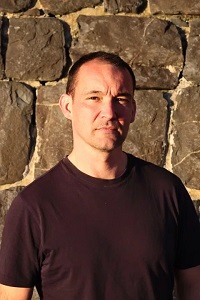
Cynan Jones (Aberystwyth, 27 februari 1975)
De Nederlandse dichter Mischa Andriessen werd geboren in Apeldoorn op 27 februari 1970. Zie ook alle tags voor Mischa Andriessen op dit blog.
De vogelkoning
Het zijn normaal jonge jongens.
In de lente verlaten ze hun huizen
halsoverkop, alsof iemand hen riep.
Wie overleeft, herinnert zich niet
wat het was – het zachte wieken
van wijd uitgestrekte vleugels
een stille roep, zoals stenen zingen
in de hoofden van krankzinnigen.
Van sommigen zijn de vaders
eerder gegaan, er is geen kaart
een richting, geen route; soms
komt er een aan, keert terug
naar waar hij eens vertrok
vertelt het na, vervormd, gehavend
kleren tot op de draad kapot
de blik spreekt louter waanzin:
Een arendsnest op de rotsen
weggedraaide ogen, paarse lippen
heel het gastpad afgedwaald
om weer hier te zijn.
De mare wil dat ze luisteren.
Portaal
Vader stond buiten voor de deur.
De zoon stuurde hem weg, wachtte
lange dagen tot hij terugkwam
verjaagde hem telkens opnieuw
maar keek bij elke terugkeer langer
prentte zijn trekken in als zocht hij
ten slotte iets om zich te kunnen herinneren.
Toen vader toch weer op het tuinpad stond
schoot hij ogenblikkelijk zijn jas aan, ging
naar buiten, trok de deur achter zich dicht.
Ze liepen samen op, kenden de richting.

Mischa Andriessen (Apeldoorn, 27 februari 1970)
De Amerikaanse schrijver John Steinbeck werd geboren in Salinas, Californië, op 27 februari 1902. Zie ook alle tags voor John Steinbeck op dit blog.
Uit: The Grapes of Wrath
“And all the time the farms grew larger and the owners fewer. And there were pitifully few farmers on the land any more. And the imported serfs were beaten and frightened and starved until some went home again, and some grew fierce and were killed or driven from the country. And farms grew larger and the owners fewer.
And the crops changed. Fruit trees took the place of grain fields, and vegetables to feed the world spread out on the bottoms: lettuce, cauliflower, artichokes, potatoes–stoop crops. A man may stand to use a scythe, a plow, a pitchfork; but he must crawl like a bug between the rows of lettuce, he must bend his back and pull his long bag between the cotton rows, he must go on his knees like a penitent across a cauliflower patch.
And it came about that owners no longer worked on their farms. They farmed on paper; and they forgot the land, the smell, the feel of it, and remembered only that they owned it, remembered only what they gained and lost by it. And some of the farms grew so large that one man could not even conceive of them any more, so large that it took batteries of bookkeepers to keep track of interest and gain and loss; chemists to test the soil, to replenish; straw bosses to see that the stooping men were moving along the rows as swiftly as the material of their bodies could stand. Then such a farmer really became a storekeeper, and kept a store. He paid the men, and sold them food, and took the money back. And after a while he did not pay the men at all, and saved bookkeeping. “These farms gave food on credit. A man might work and feed himself; and when the work was done, he might find that he owed money to the company. And the owners not only did not work the farms any more, many of them had never seen the farms they owned.
And then the dispossessed were drawn west–from Kansas, Oklahoma, Texas, New Mexico; from Nevada and Arkansas families, tribes, dusted out, tractored out. Carloads, caravans, homeless and hungry; twenty thousand and fifty thousand and a hundred thousand and two hundred thousand.”
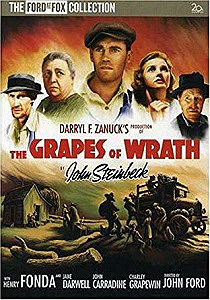
John Steinbeck (27 februari 1902 – 20 december 1968)
Poster voor de gelijknamige film uit 1940
De Portugese dichter, vertaler en essayist Ruy de Moura Belo werd geboren op 27 februari 1933 in São João da Ribeira, nabij Rio Maior. Zie ook alle tags voor Ruy Belo op dit blog.
Anniversary Mass
It’s been one year since your steps
last walked in our parish
Where do you who belonged to these fields
whose wheat is again turning ripe
belong now?
What’s your new name?
Can there be a more unusual weekend
than a saturday like this one that never ends?
How do you fill your time
now that all the time ahead of you is free?
What sort of steps might take you
behind the cooing of a dove in our skies?
Why have you never again had a birthday
even though the table is set and waiting for you
and the mulberry trees along the road are in bloom again?
That’s what his voice was like that’s how he talked
says the yellow-flowered broom that grows here
and that saw him walk on the pathways of childhood
next to his first flight of partridges
Now only in our neckties do we take you who are dead
to those paths where you left the mark of your feet
Only in our neckties. Your death
has stopped dressing us up completely
The summer you departed I clearly remember
thinking profound things
It’s summer again. You have ever less place
in this corner of us where every year
we will piously unearth you
Until the death of your death
Vertaald door Richard Zenith
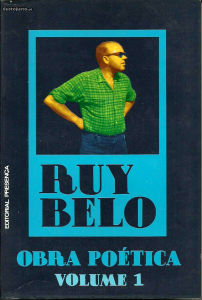
Ruy Belo (27 februari 1933 – 8 augustus 1978)
Cover
De Britse dichter en schrijver Lawrence George Durrell werd geboren op 27 februari 1912 in Jalandhar in India. Zie ook alle tags voor Lawrence Durrell op dit blog.
Uit: Bitter Lemons of Cyprus
“Journeys, like artists, are born and not made. A thousand differing circumstances contribute to them, few of them willed or determined by the will — whatever we may think. They flower spontaneously out of the demands of our natures — and the best of them lead us not only outwards in space, but inwards as well. Travel can be one of the most rewarding forms of introspection … These thoughts belong to Venice at dawn, seen from the deck of the ship which is to carry me down through the islands to Cyprus; a Venice wobbling in a thousand fresh-water reflections, cool as a jelly. It was as if some great master, stricken by dementia, had burst his whole colour-box against the sky to deafen the inner eye of the world. Cloud and water mixed into each other, dripping with colours, merging, overlapping, liquefying, with steeples and balconies and roofs floating in space, like the fragments of some stained-glass window seen through a dozen veils of ricepaper. Fragments of history touched with the colours of wine, tar, ochre, blood, fire-opal and ripening grain. The whole at the same time being rinsed softly back at the edges into a dawn sky as softly as circumspectly blue as a pigeon’s egg. Mentally I held it all, softly as an abstract painting, cradling it in my thoughts — the whole encampment of cathedrals and palaces, against the sharply-focused face of Stendhal as he sits forever upon a stiff-backed chair at Florian’s sipping wine: or on that of a Corvo, flitting like some huge fruit-bat down these light-bewitched alleys … The pigeons swarm the belfries. I can hear their wings across the water like the beating of fans in a great summer ballroom. The vaporetto on the Grand Canal beats too, softly as a human pulse, faltering and renewing itself after every hesitation which marks a landing-stage. The glass palaces of the Doges are being pounded in a crystal mortar, strained through a prism. Venice will never be far from me in Cyprus — for the lion of Saint Mark still rides the humid airs of Famagusta, of Kyrenia. It is an appropriate point of departure for the traveller to the eastern Levant … But heavens, it was cold. Down on the grey flagged quay I had noticed a coffee-stall which sold glasses of warm milk and croissants. It was immediately opposite the gang-plank, so that I was in no danger of losing my ship. A small dark man with a birdy eye served me wordlessly, yawning in my face, so that in sympathy I was forced to yawn too. I gave him the last of my liras. There were no seats, but I made myself comfortable on an upended barrel and, breaking my bread into the hot milk, fell into a sleepy contemplation of Venice from this unfamiliar angle of vision across the outer harbour. A tug sighed and spouted a milky jet upon the nearest cloud.”
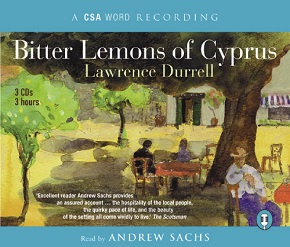
Lawrence Durrell (27 februari 1912 – 7 november 1990)
Cover
De Canadese dichter, schrijver en essayist André Roy werd geboren op 27 februari 1944 in Montréal. Zie ook alle tags van André Roy op dit blog.
Het is nog nacht
Het is nog nacht
de actieve droom,
de machine van actie;
de nacht in de bossen, de woestijnen, de steden.
Ik droomde van twee werelden:
een, zichtbaar en sterfelijk;
de andere, onzichtbaar, met fantomen
moe sinds de geboorte.
Ik observeer, ik zie de dans van de tijd,
de criminelen die ’s nachts terugkwamen.
In de nacht houden wij ons op
In de nacht houden wij ons op
jij, ik, wij, de anderen, die zijn zoals wij.
Nogmaals de actie,
de structuur van het denken in actie.
Moderne wereld van bossen en water.
Je behoort tot de reizende kooplieden,
onze voorouders de vampieren.
De steden, de huizen, de bedden,
waar we ons mysterieus, onmogelijk,
onsterfelijk waanden
wat een waanzin!
Het verlangen stroomt;
we zouden onszelf kunnen doden
voor de kennis van het verlangen.
Vertaald door Frans Roumen
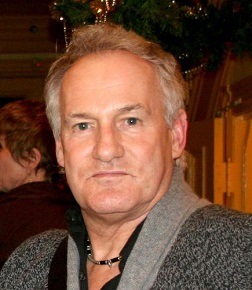
André Roy (Montréal, 27 februari 1944)
De Duitse schrijfster en dichteres Elisabeth Borchers werd geboren in Homberg op 27 februari 1926. Zie ook alle tags voor Elisabeth Borchers op dit blog.
Niemand behaupte
Niemand behaupte
ich sei taub.
Allabendlich höre ich
die Unrast der Sterne.
Niemand behaupte
ich sei blind oder lahm.
Ich nehme Stock und Stein
bis zum jähen Ereignis.
Niemand behaupte
ich hätte zu träumen versäumt.
Ich werde nicht nach Tibet reisen
und auch nicht nach Tanger.
Mir träumte
ich fände den Weg
nicht zurück.
An ein Kind
Wenn wir lange genug warten,
dann wird es kommen.
Heute noch, fragt das Kind.
Heut oder morgen. Ein Schiff,
mußt du wissen, braucht Zeit.
So weit und breit wie das Meer.
Dann bist du groß.
Dann steigen wir ein
und machen die Reise.
Zusammen. Wir beide.
Und jeder auf seine Weise.
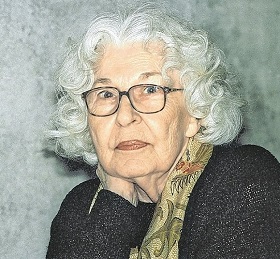
Elisabeth Borchers (27 februari 1926 – 25 september 2013)
De Amerikaanse schrijver James Thomas Farrell werd geboren op 27 februari 1904 in Chicago. Zie ook alle tags voor James T. Farrell op dit blog.
Uit: Father and Son
“When he’d come home, Bill was there, white and scared. But he hadn’t hit him. He’d talked to Bill like a father. Lizz had gone to see McCarthy, the police sergeant whose boys played with Bill and Danny, and McCarthy had quashed it all. He’d paid for the pocketbook, and it was all forgotten. After that, Bill had settled down. Now, you couldn’t want for a decenter boy. He looked at his leathery face in the mirror. He washed it, dried himself, cleaned out the wash bowl, and left the bathroom. He put on his khaki shirt, passed through the small hallway to the dining room, and was ready to eat. The dining-room table was covered with dishes and papers. In the center of it there was a large glass cake-dish, which contained crumbs and a stale chunk of cake. Lizz pushed dishes aside and set coffee, sugar buns, and a plate of ham and eggs before him. She wore an old apron and had a rag tied under her chin. She looked sloppy. Jim pitched into the ham and eggs. “I was over to see my mother yesterday,” Lizz remarked, sitting down to talk with him. He nodded, but said nothing. He bit into a sugar bun. He was waiting to see whether or not she’d had another scrap with her people. “Mother said that Al isn’t well,” she said. “You wouldn’t think he would be, having a doctor like Mike Geraghty,” Jim said, suddenly bitter. His face clouded. He remembered his Little Arty, now three years dead. All their good luck had to come after Arty was long since dead. He wiped up the yolk from the plate with a bun and ate it, and then he shoved his plate aside and handed Lizz his cup for more coffee. She returned with a filled cup and sat down. “Lizz, it’s a long time since the little fellow left us. You really ought to take off your mourning. If you do that you won’t be sad so often. You have to let time heal old wounds,” he said, his voice kindly. “Oh, Jim, I see the children playing on Calumet Avenue, and it breaks my heart. Not one of them is as beautiful as our Arty was.” “Come on now, Lizz, we’ve got to brace up. We’ve got lots to be thankful for, even with the tough breaks we had in the past,” he said, but the image of little Arty stood in his mind, a lovely, light-haired boy in a dirty dress, staring with those wonderful sad eyes and saying “Fither.” Lizz wiped her eyes with her apron. “Jim, I can’t help it. I look at our new house and I think of him. Oh, how he would have loved it. He’d be going to school this year or next. Everywhere I see, Jim, makes me think of him. I can’t help it. I can’t take off my mourning,” she said in tears.”
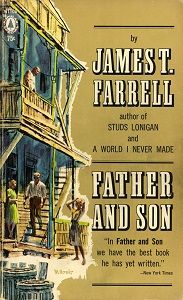
James T. Farrell (27 februari 1904 – 22 augustus 1979)
Cover
De Amerikaanse schrijver Irwin Shaw werd geboren op 27 februari 1913 als Irwin Gilbert Shamforoff in New York. Zie alle tags voor Irwin Shaw op dit blog.
Uit: Rich Man, Poor Man
“Boylan was standing at the bar in his tweed topcoat, staring at his glass, when Rudolph came down the little flight of steps from Eighth Street, carrying the overnight bag. There were only men standing at the bar and most of them were probably fairies. “I see you have the bag,” Boylan said. “She didn’t want it.” “And the dress?” “She took the dress.” “What are you drinking?” “A beer, please.” “One beer, please,” Boylan said to the bartender. “And I’ll continue with whiskey.” Boylan looked at himself in the mirror behind the bar. His eyebrows were blonder than they had been last week. His face was very tan, as though he had been lying on a southern beach for months. Two or three of the fairies at the bar were equally brown. Rudolph knew about the sun lamp by now. “I make it a point to look as healthy and attractive as I can at all times,” Boylan had explained to Rudolph. “Even if I don’t see anybody for weeks on end. It’s a form of self-respect.” Rudolph was so dark, anyway, that he felt he could respect himself without a sun lamp. The bartender put the drinks down in front of them. Boylan’s fingers trembled a little as he picked up his glass. Rudolph wondered how many whiskies he had had. “Did you tell her I was here?” Boylan asked. “Yes.” “Is she coming?” “No. The man she was with wanted to come and meet you, but she didn’t.” There was no point in not being honest. “Ah,” Boylan said. “The man she was with.” “She’s living with somebody.” “I see,” Boylan said flatly. “It didn’t take long, did it?” Rudolph drank his beer. “Your sister is an extravagantly sensual woman,” Boylan said. “I fear for where it may lead her.” Rudolph kept drinking his beer. “They’re not married, by any chance?” “No. He’s still married to somebody else.” Boylan looked at himself in the mirror again for a while. A burly young man in a black turtle-neck sweater down the bar caught his eye in the glass and smiled. Boylan turned away slightly, toward Rudolph. “What sort of fellow is he? Did you like him?” “Young,” Rudolph said. “He seemed nice enough. Full ofjokes.” “Full of jokes,” Boylan repeated. “Why shouldn’t he be full of jokes? What sort of place do they have?” “Two furnished rooms in a walkup.” “Your sister has a romantic disregard of the advantages of money,” Boylan said. “She will regret it later. Among the other things she will regret.” “She seemed happy.” Rudolph found Boylan’s prophecies distasteful.”
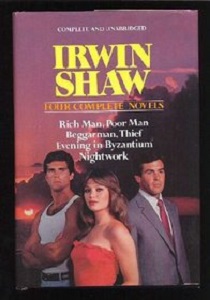
Irwin Shaw (27 februari 1913 – 16 mei 1984)
Cover voor een omnibus
Zie voor nog meer schrijvers van de 27e februari ook mijn blog van 27 februari 2018 en eveneens mijn blog van 27 februari 2016 deel 2.

